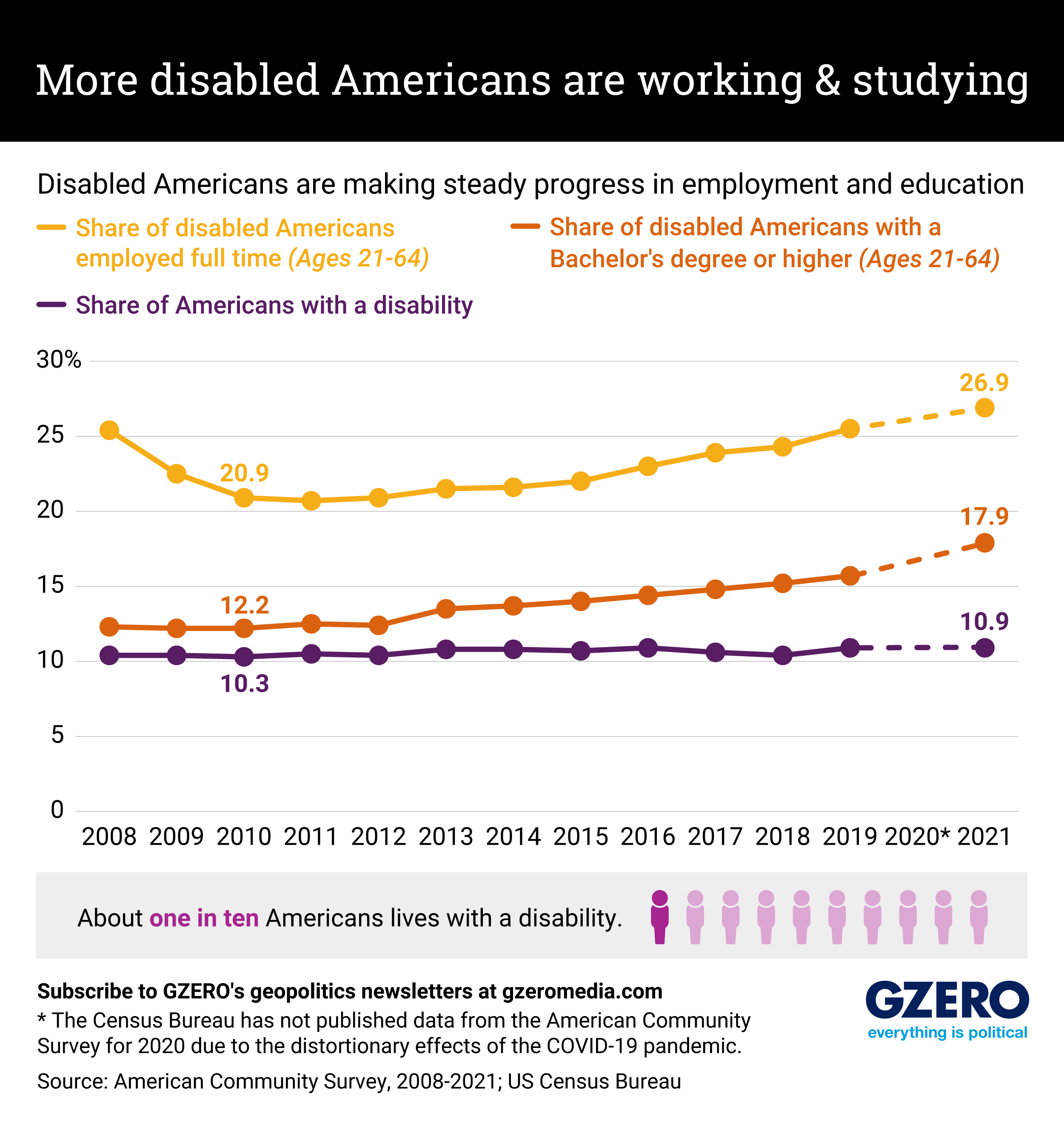October 11, 2023
How well does the world’s largest economy offer opportunities to those with disabilities? For National Disability Employment Awareness Month, we delved into the data from the Census Bureau’s annual American Community Survey to find out.
The good news? Over the last decade, the one in 10 Americans with physical, developmental, or intellectual disabilities have made major progress in finding full-time employment and graduating from university.
The share of Americans aged 21-64 with at least one disability who held full-time employment rose from 20.9% in 2010 to 26.9% in 2021. Simultaneously, the share of the same demographic who hold at least a Bachelor’s degree grew from 12.2% to 17.9%. Both are the highest numbers on record since comparable data collection began in 2008.
America’s progress on tertiary education for people with disabilities is particularly laudable given that disability rights activist Eddie Ndopu recently told GZERO that 98% of children with disabilities in the developing world “never see the inside of a classroom.”
But many systemic barriers remain. According to the Center for American Progress, people with disabilities are too often the employees of last resort – the first out in a recession and the last in during boom times – which CAP says “showcases the persistence of systemic ableism in the labor market.” Indeed, Census Bureau data shows that full-time employment rates for people with disabilities cratered during the 2008 financial crisis and did not recover until 2019 – about four years behind the job market for the general population.
Income-based limits on government benefits are also a problem. CAP says programs including Supplemental Security Income, Medicaid, and Social Security Disability Insurance — without which millions of people with disabilities and their families would have no way to afford the medical care and social work support they need — “cut off support or result in penalization if even the most basic economic security is reached.” That means Americans who are ready and willing to work full-time must deliberately seek part-time work to avoid earning money that would result in losing the support they depend on to survive.More For You
- YouTube
At the 2026 World Economic Forum in Davos, GZERO’s Tony Maciulis spoke with Ariel Ekblaw, Founder of the Aurelia Institute, about how scaling up infrastructure in space could unlock transformative breakthroughs on Earth.
Most Popular
Haitian soldiers keep a watch outside the venue where businessman Laurent Saint-Cyr is set to be designated as president of Haiti's Transitional Presidential Council (CPT), in Port-au-Prince, Haiti, August 7, 2025.
REUTERS/Fildor Pq Egeder/File Photo
On Friday, US officials warned the transitional council in charge of Haiti not to remove interim Prime Minister Alix Didier Fils-Aimé, ahead of a deadline for the council to step down on Feb. 7.
Moldovan President Maia Sandu speaks during a Council of Europe diplomatic conference to launch the International Claims Commission for Ukraine, aimed at handling compensation claims related to Russia's war in Ukraine, in The Hague, Netherlands, December 16, 2025.
REUTERS/Piroschka van de Wouw
The president of the tiny eastern European country has suggested possibly merging with a neighbor.
Hard numbers: US pitches “New Gaza,” Japan paves way for snap elections, “Sinners” smashes records, & More
Jan 23, 2026
Middle East negotiator and son-in-law of President Trump, Jared Kushner talks with Israeli diplomats following a joint press conference in the State Dining Room of the White House in Washington, DC, USA, 29 September 2025.
$25 billion: The minimum amount of investment required to fulfil Jared Kushner’s ambitious property plan for Gaza.
© 2025 GZERO Media. All Rights Reserved | A Eurasia Group media company.
